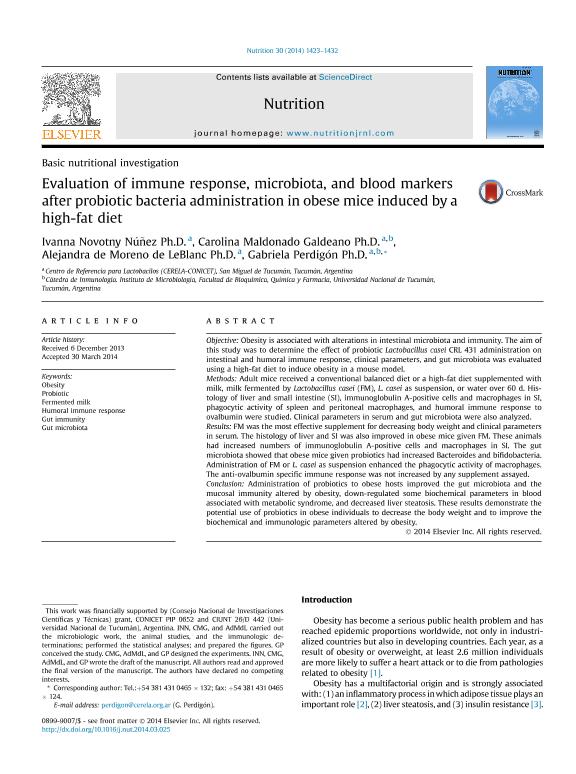Artículo
Evaluation of immune response, microbiota, and blood markers after probiotic bacteria administration in obese mice induced by a high-fat diet
Novotny Núñez, Ivanna ; Maldonado Galdeano, María Carolina
; Maldonado Galdeano, María Carolina ; de Moreno, Maria Alejandra
; de Moreno, Maria Alejandra ; Perdigon, Gabriela del Valle
; Perdigon, Gabriela del Valle
 ; Maldonado Galdeano, María Carolina
; Maldonado Galdeano, María Carolina ; de Moreno, Maria Alejandra
; de Moreno, Maria Alejandra ; Perdigon, Gabriela del Valle
; Perdigon, Gabriela del Valle
Fecha de publicación:
11/2014
Editorial:
Elsevier Science Inc
Revista:
Nutrition
ISSN:
0899-9007
e-ISSN:
1873-1244
Idioma:
Inglés
Tipo de recurso:
Artículo publicado
Clasificación temática:
Resumen
Objective: Obesity is associated with alterations in intestinal microbiota and immunity. The aim of this study was to determine the effect of probiotic Lactobacillus casei CRL 431 administration on intestinal and humoral immune response, clinical parameters, and gut microbiota was evaluated using a high-fat diet to induce obesity in a mouse model. Methods: Adult mice received a conventional balanced diet or a high-fat diet supplemented with milk, milk fermented by Lactobacillus casei (FM), L. casei as suspension, or water over 60d. Histology of liver and small intestine (SI), immunoglobulin A-positive cells and macrophages in SI, phagocytic activity of spleen and peritoneal macrophages, and humoral immune response to ovalbumin were studied. Clinical parameters in serum and gut microbiota were also analyzed. Results: FM was the most effective supplement for decreasing body weight and clinical parameters in serum. The histology of liver and SI was also improved in obese mice given FM. These animals had increased numbers of immunoglobulin A-positive cells and macrophages in SI. The gut microbiota showed that obese mice given probiotics had increased Bacteroides and bifidobacteria. Administration of FM or L. casei as suspension enhanced the phagocytic activity of macrophages. The anti-ovalbumin specific immune response was not increased by any supplement assayed. Conclusion: Administration of probiotics to obese hosts improved the gut microbiota and the mucosal immunity altered by obesity, down-regulated some biochemical parameters in blood associated with metabolic syndrome, and decreased liver steatosis. These results demonstrate the potential use of probiotics in obese individuals to decrease the body weight and to improve the biochemical and immunologic parameters altered by obesity.
Archivos asociados
Licencia
Identificadores
Colecciones
Articulos(CERELA)
Articulos de CENTRO DE REFERENCIA PARA LACTOBACILOS (I)
Articulos de CENTRO DE REFERENCIA PARA LACTOBACILOS (I)
Citación
Novotny Núñez, Ivanna; Maldonado Galdeano, María Carolina; de Moreno, Maria Alejandra; Perdigon, Gabriela del Valle; Evaluation of immune response, microbiota, and blood markers after probiotic bacteria administration in obese mice induced by a high-fat diet; Elsevier Science Inc; Nutrition; 30; 11-12; 11-2014; 1423-1432
Compartir
Altmétricas



